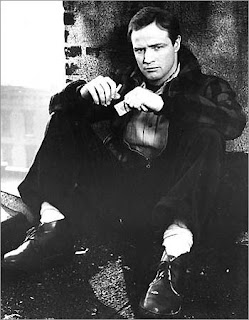
Elia Kazan's Oscar winning film On the Waterfront (1954) doesn't really ask a lot of us as an audience. I mean Lee J Cobb might as well be wearing a big black cowboy hat and matching coat and pants. He's rotten to the core. Ditto his many henchmen, a few of whom are decked out in ebony.
Karl Malden is appropriately attired as the priest and has the whole "what would Jesus do?" routine down cold.
Eva Marie Saint's character lives up to her last name. Edie Doyle is saintly and well intended and both physically and morally unblemished.
That's why we need Marlon Brando's Terry Malloy. Without this conflicted character we've got a movie that's all black and white. With him there's shading, shadows and questions.
This is one of Brando's great performances (which is like saying one of Willie Mays' great seasons or Botticelli's great paintings). Who else could have been do dumb and so wise at the same time? Who else could have convinced us of a character's moral vacuity then made us belief this same man had transformed into a veritable John the Baptist?
On the Waterfront deals largely with an incredibly complex issue: questions surrounding informing. aka naming names, snitching, being a rat, bearing witness. Simply put one person's rat is another one's star witness. Criminal enterprises, from the Mafia to schoolyard bullies rely on witnesses and accomplices keeping their mouths shut. Not talking to the authorities can be framed as a question of honor to one party and abetting a crime by the other party. Of course there's also the issue of naming names, something Kazan himself was most guilty of. Kazan and others have done it to save their own skins while condemning others, sometimes for nothing worse than past political affiliations -- for shame, Elia!
I remember as a lad learning that if you participated in some shenanigans and "told on" your mates you were lower than low -- a rat. In today's street culture this notion has been twisted to such a degree that anyone who tells what they know, even the victim, is a snitch. Young people even wear shirts that proclaim, "Stitches for snitches." Moral ambiguity has now been outright perverted into total confusion. It's been totally rigged so that criminals win.
But criminals don't win in On the Waterfront. Terry Malloy is a bum. He knows it and embraces it. He's an uneducated ex boxer and longshoreman, but he's got something more powerful than his right cross, self awareness. Book smart he's not. Street wise, sure. But most importantly, he thinks things through. It's the very definition of being philosophical. With not so gentle prodding from Malden's priest and the love of the almost too perfect Edie, Terry does the right thing. He does right by himself and his working brethern.
Cobb's somewhat ironically named Johnny Friendly is a one of the nastier villains of film in large part because he can be so beguiling. All pats and squeezes for Malloy, warm bonhomie, jests and loud bravado. As union boss he commands a small army and you can see why his inner circle is so loyal. Within the confines of their criminal world he creates a comfy brotherhood of men working and profiting together (to be sure he profits the most) and outsiders are not to be trusted and least of all talked to. Such insularity is tough to breakdown and when the cost of attempting to do so is death you've got a formidable opponent. And my God the man is tough. You neither want to challenge or question such a leader nor do you ever feel you need to. When others do it by talking to the law they are issuing a challenge not just to your boss but to your very cozy world.
At his right hand Friendly has Charlie 'The Gent' Malloy (Rod Steiger) who not incidentally is Terry's brother and the brains of the family. Yeah but if he's so smart why does he cleave so tightly to a crooked boss? It's like being best buddies with a rattlesnake. If you tick off that snake its got a nasty bite. With Friendly one bite is lethal.
Ultimately Friendly overplays his hand and the conflicted Terry is conflicted no more. He has the courage to think for himself, to question and then to act. Woe be the crook who crosses the thinker.
On the Waterfront is so thoroughly watchable a film in large part because of all its bigger than life performances. Brando, Cobb, Steiger, and Malden were the movie equivalent of power hitters who were swinging from the heels. They all homered too. There's shouting and broad emotions and passion and not a wit of it is gratuitous, its all there in Budd Schulberg's script. In her film debut Ms. Saint took on the incredibly difficult task of sharing space with these men. She was not intimidated.
So while the film doesn't require much of its audience it gives one helluva lot in return.
No comments:
Post a Comment